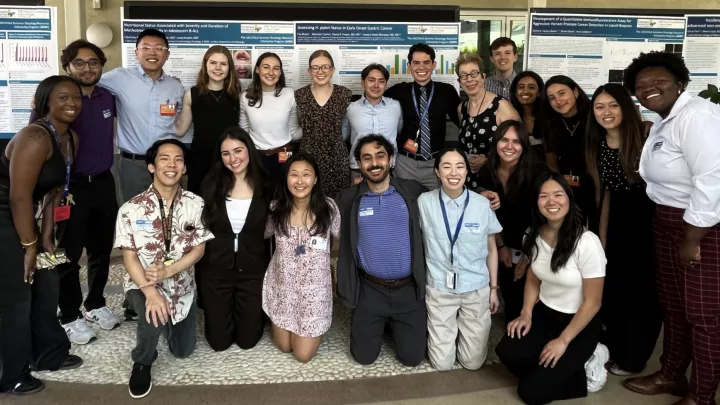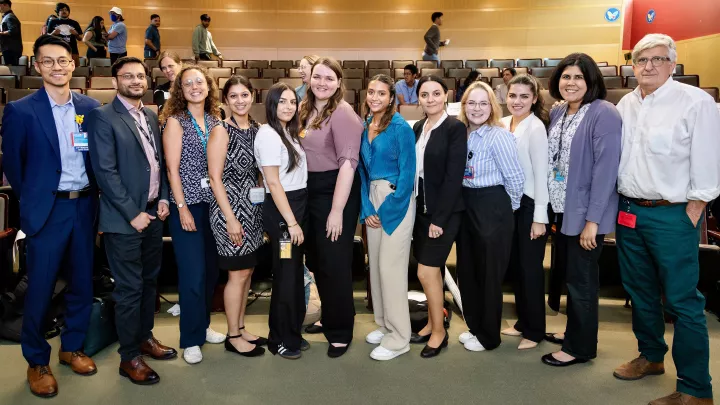Donnell Scholars
2024-present

Madeline Goldfarb, MD
Madeline Goldfarb received her medical degree from Texas Tech University Health Science Center El Paso Foster School of Medicine where she graduated with a Distinction in Research and Scholarship.
As an undergraduate student at the University of Texas at Austin, Madeline majored in Psychology as a graduate of the Plan 1 Liberal Arts Honors Program. Her scholarly journey began as an undergraduate volunteer in neuroscience and biobehavioral health laboratories. After college, she worked for The Andrew McDonough B+ Foundation, a nonprofit whose aim is to fight pediatric cancer.
She continued to pursue this passion throughout medical school, joining Dr. Rajkumar Lakshmanaswamy and Dr. Ramadevi Subramani Reddy’s labs, performing in-vitro studies to evaluate the anticancer properties of neem tree phytochemicals on multiple types of solid tumors. She also conducted clinical research projects under the direction of Dr. Gerald Gollin, examining the PHIS database to perform analyses of patients with necrotizing enterocolitis and their outcomes based on the use of antibiotics and surgery.
Her aim as a pediatric resident is to further expose herself to the subspecialties within the pediatric profession—as well as research settings, engaging in translational and clinical trial studies. As a member of The George Donnell Society for Pediatric Scientists, she hopes to continue developing her role as a physician scientist and work collaboratively alongside mentors to identify novel therapeutics. Driven by a desire to make meaningful contributions to her field, Madeline plans to pursue a career as a pediatric specialist, with interests in oncology, cardiology, and critical care.

Jenna Lee, MD
Dr. Jenna Lee received her undergraduate degree at Colgate University and her medical degree at Rutgers Robert Wood Johnson Medical School. Driven by a personal connection to pediatric populations with neurocognitive disabilities, Dr. Lee has dedicated herself to advocacy and improving the quality of care for these children. Her journey began with firsthand experiences that highlighted the unique challenges faced by these individuals and their families. Dr. Lee is currently a general surgery resident at Rutgers Robert Wood Johnson University Hospital in New Brunswick, NJ. Motivated by a deep sense of compassion and commitment, she pursued a focus on quality improvement projects at her training program, aiming to enhance the support systems and healthcare services available to this vulnerable population.
Upon completion of her general surgery residency, Dr. Lee intends to pursue fellowship training in pediatric surgery. Her career goal is to work as an academic pediatric surgeon with a research focus on clinical outputs following surgery in vulnerable pediatric populations. Towards this goal, she will be joining the division of Pediatric Surgery at CHLA as a post-doctoral research fellow in the Health Outcomes and Policy Effects (HOPE) lab under the mentorship of Dr. Kelley-Quon.

Matthew Marcelino, MD
Dr. Matthew Marcelino received his bachelor’s degree in neuroscience from Vassar College. After graduating, he became a clinical research assistant in the adult Pulmonary and Critical Care division at Weill Cornell Medicine. Conducting Phase I-IV studies in chronic pulmonary conditions such as interstitial lung disease and chronic obstructive pulmonary disorder, Matthew began to recognize the importance of lung health and the need for early disease intervention and prevention.
Combining this perspective with his passion for pediatrics, Dr. Marcelino continued his pulmonary research in the neonatology division as a SUNY Downstate medical student. Under Dr. Jacob Aranda and Kay Beharry, he received a research grant to investigate the impact of intermittent hypoxia and free radical damage on pulmonary microvascular development. Following publication, the medical school recognized this project with the institution’s top student award for investigative research. Through collaborations with other residents, fellows, and researchers in the neonatal lab, Dr. Marcelino has also had opportunities to assist in various neonatal projects assessing the impact of differential oxygen conditions on multiple organ systems. These experiences reinforced his commitment to pursuing neonatal translational research that optimizes pulmonary health and reduces systemic comorbidities associated with hypoxia.
Dr. Marcelino is a PGY-1 at CHLA and aspires to become a neonatologist. He believes that the Saban Institute’s world-class research opportunities, combined with CHLA’s utmost clinical excellence, establish an incredible environment for bringing the best translational medicine to some of the most fragile, vulnerable patients.

Kyra Newmaster, MD, PhD
Kyra Newmaster, MD, PhD received her medical degree and doctorate degree in Neuroscience from Penn State College of Medicine.
During her undergraduate studies at Shippensburg University, Kyra majored in biochemistry. She studied metabolic signaling and autophagy in Glioblastoma (GBM) using genetically engineered cell lines and confocal microscopy. She was then awarded an Oak Ridge Institute for Science and Education (ORISE) Fellowship to generate high-throughput protein microarrays for the evaluation of antiviral compounds effective against the Middle Eastern Respiratory virus under the guidance of Dr. Robert Ulrich at the United State Army Research Institute of Infectious Diseases.
During graduate school, Kyra performed her dissertation research with Dr. Ypngsoo Kim which focused on mapping the postnatal trajectory of the oxytocin system on the brain using serial two photon (STP) microscopy and advanced whole brain image analysis. She investigated the spatiotemporal dynamics of neural maturation using early intermediate protein markers and light sheet microscopy in collaboration with Dr. Yingxi Lin. During her medical training, Kyra also generated machine learning algorithms to predict genetic methylation patterns based on MRI features in patients with glioblastoma.
Kyra is currently pursuing Pediatric Neurology training and plans to study the developmental impact of early life epilepsy, gene therapy for epileptic encephalopathies, and improving care for children with genetic epilepsies.

Hao Wang, MD, MS
Hao Wang, MD, MS received his medical degree from Duke-NUS Medical School, Singapore and his master’s degree from Uppsala University, Sweden.
Prior to medical school, he participated in the development of cell therapy for multiple sclerosis using chimeric antigen receptor T regulatory cells and genetically re-engineered mesenchymal stem cells in Rudbeck Laboratory, Uppsala, Sweden. As a medical student and pediatric trainee in Singapore, he completed an observational study on the long-term renal outcome of children with Henoch-Schönlein purpura.
He was drawn to the field of bioinformatics during his postdoctoral fellowship in University of California San Diego and its Kawasaki Disease (KD) Research Center. He identified four distinct clinical subtypes of KD using unsupervised machine learning algorithms, which were further supported by multi-omic evidence. He also contributed to the discovery of genomic underpinnings of brain morphology and risks of common neuropsychiatric disorders.
Dr. Wang is interested to continue his research endeavor in studying the heterogeneity of pediatric inflammatory disorders using data science approaches and artificial intelligence. He plans to pursue a fellowship in a relevant pediatric subspecialty.
2023-present

Abhik Banerjee, MD, PhD
Research Title: Testing for Functional Rescue in iPS Cell-derived Cortical Organoids Carrying Pathogenic Variants of SYNGAP1
Abhik K. Banerjee, MD, PhD received his medical degree from the Keck School of Medicine of the University of Southern California and his doctorate degree in Biology from the California Institute of Technology.
As an undergraduate student at the University of California Los Angeles, Abhik majored in Molecular, Cell, and Developmental Biology, as well as Music Performance. He was involved in biomedical research, first characterizing developmental gene expression in the Drosophila melanogaster fruit fly and later developing a fruit fly model for the Pediatric growth restriction syndrome abbreviated IMAGe Syndrome (Intrauterine Growth Restriction, Metaphyseal Dysplasia, Adrenal Hypoplasia Congenita, and Genitourinary Anomalies). Interestingly, the same gene mutated in IMAGe syndrome is also implicated in a Pediatric overgrowth condition called Beckwith-Wiedemann Syndrome, which he coincidentally later studied in graduate school.
During graduate school, Abhik performed dissertation research in the laboratories of Dr. Mitchell Guttman and Dr. Ellen Rothenberg, specifically examining the roles of RNA-binding proteins in Barr Body formation, genomic imprinting, and early T-cell development. In 2020 as part of the early pandemic response, he volunteered to perform research characterizing the mechanisms of SARS-CoV-2 viral pathogenesis and identified three, RNA-mediated mechanisms used by the virus for host-cell takeover and interferon response suppression. Prior to formally joining a laboratory, Abhik worked with the late Dr. Paul Patterson and helped develop a directed evolution based-method for engineering Adeno-Associated Virus gene therapy vectors with improved sensitivity and specificity to the central nervous system. Outside of the laboratory, he volunteered with the American Physician Scientists Association and served as its national president from 2019-2020.
Abhik will pursue a career in Pediatric Neurology and has clinical and research interests in neurogenetics, gene therapy, and applications of systems biology in neuroinfectious disease.
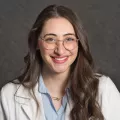
Ruby Barq, MD
Research Title: Opioid and Methadone Prescribing for Infants with Surgical Congenital Heart Disease
Dr. Ruby Barq received her undergraduate degree at the University of Central Florida. It was during this time that she developed her passion for global advocacy and healthcare with her involvement in the Syrian American Council and work with Syrian refugees. After college, she continued her involvement with global advocacy while enrolled in medical school at the George Washington University School of Medicine and Health Sciences in Washington, D.C. In medical school, as part of a Global Health Curriculum Track, she spent several months working in a refugee clinic in Lebanon and with researchers at the Global Health Institute at the American University of Beirut. It was in Lebanon where she discovered her passion for research while working on a feasibility study to establish funding for the refugee clinic from the United Nations. This sparked an interest that led her to assist with and publish several papers on various clinical topics in medical school and in residency.
Dr. Barq is currently a general surgery resident at Virginia Commonwealth University Health in Richmond, VA. She will be joining the division of pediatric surgery at CHLA as a post-doctoral research fellow in the Health Outcomes and Policy Effects (HOPE) lab led by Dr. Lorraine Kelley-Quon. Her current research examines the impact of prescription opioid use among pediatric populations.
Dr. Barq plans to pursue a fellowship in pediatric surgery after her general surgical residency is complete. She looks forward to working in the HOPE lab, and contributing to the growing body of research that will serve to help guide clinical practice in the prescription of opioids and in the treatment of medically complex infants.

Ekaterina Fomenko, MD, PhD
Research Title: Effects of GLP1 Agonists on MASLD Progression in Obese Adolescent Patients
Dr. Fomenko received her medical and doctoral degrees from the Kursk State Medical University, Russia. After completing her residency, Dr. Fomenko started her Ph.D. training addressing a significant increase in the prevalence of non-alcoholic fatty liver disease ( NAFLD). Her thesis proposed that physiological stress could be a potential factor in “multiple-hit” pathogenesis of NAFLD progression. She continued study of NAFLD as a Fulbright Scholar at the Marion Bessin Liver Research Center at Albert Einstein College of Medicine (NY), where she joined Dr. Yuling Chi’s lab. She studied signaling pathways cross-talk in animal and cell culture models of insulin-resistance and hepatic steatosis. Dr. Fomenko also participated in several translational research projects in NAFLD drug development.
Dr. Fomenko is interested in pursuing a fellowship in Pediatric Gastroenterology and looking forward to studying social determinants of health as potential pediatric NAFLD risk factors and developing new pharmaceutical agents.

Taylor Lewis, MD, MS
Research Title: Teaching Asthma Knowledge in Emergencies – A Picture-based Intervention for Caregivers
Taylor Lewis received her medical degree from the Chicago Medical School at Rosalind Franklin University of Medicine and Science.
Prior to medical school, Dr. Lewis spent two years pursuing a Masters of Science in Physiological Sciences at the University of Arizona. She conducted research in Dr. Prabir Roy-Chaudhury's lab group focused on an optimization of a mouse model for arteriovenous fistula (AVF) non-maturation in chronic kidney disease (CKD). During medical school, she collaborated with Dr. Timmy Lee at the University of Alabama Birmingham, expanding her nephrology and vascular access related research efforts, studying venous endothelial cell adaptation in an vitro versus in vivo AVF model. Taylor's research efforts throughout medical school has been recognized by the American College of Physicians (ACP) with the top award for a medical student in the state of Illinois.
Dr. Lewis is considering pursuing a fellowship in Pediatric Nephrology and aims to continue research in the field, focusing on translational and epidemiological nephrology. She is passionate about improving the equitability of health care access and outcomes as well as medical education, and aims to incorporate these interests into her research endeavors. She looks forward to meeting and working with new mentors and engaging with the state-of-the-art research happening within the Saban Research Institute.

Daneka Sterling Stryker, MD, MSc
Research Title: Barriers to Care Facing Pediatric Uveitis Patients & Families
Dr. Stryker received her medical degree from Drexel University College of Medicine and her master’s degree from University College London.
As an undergraduate, Dr. Stryker was introduced to the field of pediatric rheumatology while on a research team led by Dr. Sheila Angeles-Han at Children’s Healthcare of Atlanta. Their work involved validating Dr. Angeles-Han’s EYE-Q survey: the only uveitis-specific pediatric questionnaire measuring visual functioning & vision-related quality of life. Dr. Stryker also contributed to studies investigating appropriate biologic initiation timing, as well as the relationship between severe uveitis and race. During her master’s in Global Health & Development, Dr. Stryker grew her skills in qualitative survey development and data analysis.
In medical school, Dr. Stryker received the Rheumatology Research Foundation Medical Student Preceptorship award to develop a study with her PI Dr. Sabrina Gmuca at the Children’s Hospital of Philadelphia. They created a qualitative survey to investigate the coping mechanisms utilized by adolescents with chronic musculoskeletal pain, with the goal of informing resilience-building interventions in this population. An Abstract of their findings was presented at ACR Convergence 2022.
Dr. Stryker aims to further her translational research skills during her pediatric residency with the goal of pursuing a fellowship in pediatric rheumatology. She aims to learn from her patients about how they manage their chronic conditions, as well as their interactions with the healthcare system, in order to provide more equitable care for young people with rheumatologic conditions.
2022-present

Steven Kwasi Korang, MD, PhD
Research Title: A modified Clinical diversity in Meta-analysis (CDIM) tool to assess clinical heterogeneity for meta-analysis in pediatric critical care
Steven Kwasi Korang, MD, PhD received his medical degree and Ph.D. from the University of Copenhagen, Denmark.
He has received most of his research training at the Copenhagen Trial Unit and the GCSRT program at Harvard Medical School. His primary research topic of interest is pediatric sepsis, which was also the topic of his Ph.D. Most of his research projects have been Cochrane reviews. He recently worked under Dr. Khemani and Dr. Iyer on the PALLIC 2 guidelines for Pediatric Acute Respiratory Distress Syndrome, providing both methodological and statistical expertise to the development of the guidelines.
Dr. Korang plans to pursue a fellowship in Pediatric Critical Care after residency. He looks forward to working with the society to build the necessary skillset and network during residency and fellowship to lead RCTs in pediatric critical care.

Adam Che-An Lu, MD, PhD
Research Title: Neopterin as a Biomarker in Neuroinflammatory Disorders
Adam C. Lu, MD, PhD received his medical and doctorate degree (in neuroscience) from the University of Virginia in Charlottesville, VA.
Since his high school days in Taiwan, Adam has always aimed to apply mathematical tools to understand human biology and pathophysiology. As an undergraduate at Johns Hopkins University, he majored in biomedical engineering, mathematics, chemistry and statistics. He was involved in research investigating the cellular response to mechanical stretch and in research quantifying impulsivity in human decision making. Then as a research assistant in the National Tsing Hua University, he helped develop a computational model for spatial working memory in the fruit fly.
In graduate school, Adam joined the absence epilepsy research team of Mark P. Beenhakker, PhD at the University of Virginia. Using slice electrophysiology, he discovered that different combinations of GABA transporter blockade have surprisingly bidirectional effects on absence seizure-like thalamic oscillations. He then used both computational modeling and dynamic clamp electrophysiology to demonstrate that such bidirectional effects on oscillations could be sufficiently explained by the interaction between the time course of GABAB receptor activation and T-type calcium channel opening. This work identified the modulation of GABAB receptor kinetics as a potential new target for absence seizure treatment.
Adam will pursue a career in Pediatric Neurology and has an interest in participating in both clinical and basic science research for neurological disorders, especially those involving a loss of control. He looks forward to further develop his interdisciplinary skills to help advance the understanding of disease mechanisms and develop new treatments.

Alejandra Mallorga Hernandez, MD, MPH
Research Title: A geographical perspective: Prenatal Diagnosis of Critical Congenital Heart Disease during the COVID pandemic
Alejandra Mallorga Hernandez, MD, MPH received her medical degree from Saint Louis University and her master's degree from the University of Virginia.
As an undergraduate, Dr. Mallorga was involved in clinical research focused on liver transplantation and outcomes under the guidance of Dr. Angel Alsina at Tampa General Hospital. During medical school, she joined Dr. Adriana Montano's laboratory at the Doisy Research Center, where she worked on determining the incidence and prevalence of mucopolysaccharidosis in the US, in addition to exploring potential new technology for newborn screening for mucopolysaccharidoses.
Dr. Mallorga has also conducted QI projects at Saint Louis University (SLU), where she worked on determining the SLU SOM free-clinic area of service and barriers to healthcare using ArcGIS and SAS.
Dr. Mallorga plans on pursuing a pediatric cardiology fellowship and is looking forward to conducting clinical research as well as being a strong community advocate at CHLA.

Indulaxmi Seeni, MD
Research Title: Characterizing Multiple Organ Dysfunction Syndrome (MODS) amongst Children Acute Respiratory Distress Syndrome (ARDS)
Indulaxmi (Indu) Seeni received her medical degree from University of California, Davis in Sacramento, CA.
Prior to medical school, Dr. Seeni spent two years working as a research fellow at the National Institute of Child Health and Human Development (NICHD). She conducted research on the effects of air pollution, ambient temperature, and autoimmune disease on maternal, fetal, and neonatal health in Dr. Pauline Mendola's lab group. Dr. Seeni's paper on the effects of acute air pollution exposure on NICU admissions was nominated as a top finding for her lab and division in 2019. During medical school, she expanded her areas of research and investigated dysphagia and aspiration pneumonia in adults in Dr. Peter Belafsky's lab group.
Dr. Seeni is interested in pursuing a fellowship in Pediatric Critical Care while continuing to be an advocate for the pediatric population through public policy and community advocacy. She looks forward to collaborating with CHLA faculty and conducting research at the Saban Research Institute.
2021-present
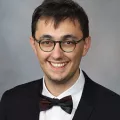
Bugra Egeli, MD
Research Title: Risk factors associated with poor treatment response and prognosis in periodic fever syndrome pediatric populations with familial Mediterranean fever (FMF) living in the Southern California area
Bugra Han Egeli, MD received his medical degree from Istanbul University, Turkey.
Since the very first years of medical school, he always showed interest in immunology and its clinical applications. For four years, he joined different clinical research projects with the rheumatology division at his medical school. He was fortunate enough to work with patients diagnosed with different autoimmune and autoinflammatory conditions, but his main interest was in periodic fevers. He developed a cohort of 4000 familial Mediterranean fever patients and worked on the prognosis of the disease and different treatment modalities including biologic agents.
Following medical school, he joined the autoinflammatory diseases team at Boston Children's Hospital and continued to work on systemic autoinflammatory diseases and their treatment. In the meantime, he finished his Master's degree at Boston University in Clinical Research.
Dr. Egeli will pursue a pediatric rheumatology fellowship following residency and continue his research efforts in the complications/treatment of these diseases. He is willing to advance his skills and to answer the research questions that appear in this area at CHLA with the help of the society.

Elizabeth Rinaldi, MD
Research Title: The Association Between the Childhood Opportunity Index and the Social Vulnerability Index and Recovery After Pediatric Acute Respiratory Distress Syndrome
Elizabeth Rinaldi received her medical degree from the David Geffen School of Medicine at UCLA in Los Angeles, California.
In medical school, Dr. Rinaldi worked with Dr. Jamil Aboulhosn at the Adult Congenital Heart Disease Center to improve outcomes in children and adults undergoing transcatheter pulmonary valve replacements. One of her projects involved using CT imaging to assess for anatomical risk factors that could predict failure of the transcatheter procedure. A second project evaluated the risk of endocarditis in patients with transcatheter pulmonary valves and the relationship between immunosuppression and endocarditis development.
Dr. Rinaldi is interested in further training in pediatric critical care and plans to pursue clinical research while continuing to be involved in community advocacy with our population here in Los Angeles. She looks forward to collaborating with CHLA and the faculty at the Saban Research Institute to provide excellent evidence-based care to our diverse patient group and developing lifelong skills in research methods and project development.
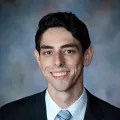
Mackenzie Silverman, MD
Research Title: Initial steps: Spatial Genomic Analysis of Group 3/4 Mixed-type Medulloblastoma in a Pediatric Cohort
Mackenzie Silverman, MD received his medical degree from Sidney Kimmel Medical College at Thomas Jefferson University in Philadelphia, PA.
In undergraduate, Dr. Silverman was involved in research at Vanderbilt University investigating the effects of ascorbic acid on blood-retinal-barrier breakdown in diabetic retinopathy. He developed skills including breeding and genotyping, immunoprecipitation, and Western blot. After undergraduate, Dr. Silverman was awarded a Post-baccalaureate Cancer Research Training Award by the National Cancer Institute and worked in the lab of Dr. Karlyne Reilly, Ph.D. There he investigated the genetic mechanisms and impacts of CDCA7L, a novel male-specific oncogene, through both in-vivo and bioinformatic analyses.
In medical school, Dr. Silverman worked in several labs developing skills in tractography as well as database development and management. Most recently, he worked with Gurcharanjeet Kaur, MD to build a database aimed at investigating and optimizing the use of genetic screening and tumor targeted therapies on pediatric patients with brain tumors in the community oncology setting.
Dr. Silverman will pursue a career in Pediatric Neurology and has a particular interest in developing and implementing tumor-targeted therapies for pediatric brain tumors. He looks forward to collaborating with faculty at The Saban Research Institute to develop the skills to drive the field of personalized neuro-oncologic care forward and explore clinical trial management.
2021-2022

Masrur Khan, MD
Masrur A. Khan, MD received his degree from Albert Einstein College of Medicine in Bronx, NY in 2019.
During medical school, he became involved in clinical research in a variety of topics, such as fever in pediatric international travelers, obstructive sleep apnea and hypertension, and medical education-related studies. As he progressed through his training in medical school and residency, he continued to hone his research skills and identify breadth of interests. His ongoing research projects are related to resident wellness and its association with breaks in training, emergency department visits for asthma, and pediatric asthma-related outcomes in the context of social and environmental determinants of health (specifically as it pertains to gentrifying neighborhoods).
Dr. Khan plans to pursue a fellowship in Pediatric Emergency Medicine. He plans to continue his academic endeavors in research as they pertain to physician wellness, medical education, and equitable healthcare distribution.
2020-present
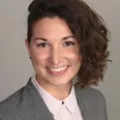
Jessica Haladyna, MD
Research Title: Multidisciplinary partnership to improve CVC hygiene and decrease CLABSI rates
Jessica N. Haladyna, MD received her medical degree from Georgetown University School of Medicine in Washington, DC.
Following her undergraduate career, Dr. Haladyna was employed in the lab of Scott Armstrong, MD, PhD at Boston Children’s Hospital training in leukemia mouse models and normal hematopoietic assays. She continued this research at Children’s Hospital Colorado in the lab of Kathrin Bernt, MD using in vitro assays, murine transplants, and genome-wide methods to further explore molecular mechanisms of childhood leukemia. Here, she was involved in several projects including 1. small molecule inhibition of an epigenetic modifier (DOT1L) as a therapy for fusion protein-driven AML, 2. mechanisms of cell resistance to the DOT1L inhibitor, and 3. therapeutic potential of a membrane ion channel (Trpm2) in AML.
In medical school, Dr. Haladyna joined the lab of Jeffrey Toretsky, MD exploring mechanisms of action for a novel therapeutic agent used in the treatment of Ewing Sarcoma. This experience helped to improve her proficiency in proteomic techniques and cell-cycle analysis.
Dr. Haladyna will pursue a fellowship in Hematology-Oncology with long-term aims in drug development and translational research. She looks forward to a well-rounded pediatric residency experience followed by rich collaboration at The Saban Research Institute developing critical thinking and project development skills for a research-immersed career in childhood leukemia.
2018-2021
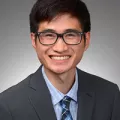
Andrew Wei, MD
Andrew Wei, MD received his medical degree from Northwestern University Feinberg School of Medicine in Chicago, Illinois.
As an undergraduate, Dr. Wei was involved in research at Lurie Children’s Hospital of Chicago investigating primary hyperoxaluria, a rare pediatric kidney disease. Then at the Germany Hyperoxaluria Center in Bonn, Germany, he helped develop a clinical assay using IC/MS for the detection of hydroxy-oxo-glutarate (HOG), a metabolite found in patients with primary hyperoxaluria type III.
In medical school, Dr. Wei joined the Jin Lab at Northwestern University, a laboratory focusing on biochemistry/immunology. He contributed to a number of projects resulting in publications: developing personalized peptide arrays to detect HLA alloantibodies in kidney transplantation, investigating oxidative stress in preeclampsia and placental angiogenesis, and researching the effects of post-translational modifications of nuclear antigens in lupus.
Dr. Wei plans on pursuing a career in pediatric critical care, with a research interest in the body’s immune response in critical states, such as in acute respiratory distress syndrome and sepsis. He finds caring for medically complex patients and families a rewarding experience. He looks forward to collaborating with faculty at The Saban Research Institute to better understand and identify therapeutics that modulate the immune system during critical illness.
2017-2023

Christopher Kuo, MD
Research Title: The Immune Landscape of the Tumor Microenvironment of Ewing sarcoma
Christopher Kuo, MD received his medical degree from Rush Medical College, Chicago, Illinois. He hopes to make an impact in the field of pediatric hematology-oncology, specifically osteosarcoma.
During his undergraduate training in Cell and Molecular Biology at the University of California, San Diego, Dr. Kuo was involved with basic biochemical research for three years investigating the role of specific proteins (MMP2/9) in breast cancer metastases. He developed basic technical skills in performing genotyping, breeding and project development. After college, he was involved with clinical trials, particularly assisting staff physicians in the assessment of concomitant medication, adverse events and quality assurance.
Dr. Kuo looks forward to developing clinical training during his pediatric residency. He plans to pursue a fellowship in Hematology-Oncology and envisions working closely with a mentor to perform prospective clinical research and conduct bench research/biochemical research in molecular targets and immunotherapies for osteosarcoma.
2015-2021

Eric Nickels, MD
Dr. Nickels received his medical degree from the University of Chicago Pritzker School of Medicine. He developed an interest in oncology as an undergraduate majoring in genetics. In medical school, Dr. Nickels was drawn to research in the area of familial cancers, in particular, hereditary forms of leukemia.
Dr. Nickels will continue to hone his clinical skills during pediatric residency. He is interested in further training in pediatric Hematology-Oncology, and plans to pursue research while maintaining and developing significant patient relationships. He envisions a career where he is able to maintain a dynamic interaction between clinical management of patients and work in the laboratory.
